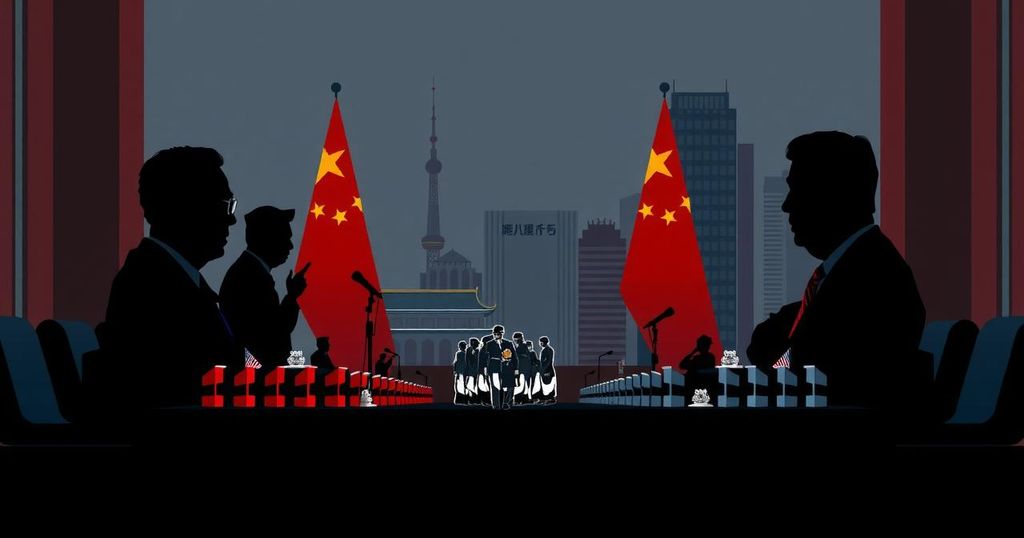Xi Jinping Engages in Unscheduled Dialogue with U.S. National Security Adviser Jake Sullivan in Beijing
In a noteworthy development, Xi Jinping, the General Secretary of the Communist Party of China, engaged in an unexpected meeting with Jake Sullivan, the U.S. National Security Adviser, during Sullivan’s three-day visit to Beijing. This significant encounter was reported by Chinese state media on Thursday afternoon, following several days of discussions between Sullivan and other senior Chinese officials, including Foreign Minister Wang Yi and a vice-chair of the Central Military Commission believed to be close to Xi.
This visit marked Sullivan’s inaugural trip to Beijing in his capacity as national security adviser, occurring amidst ongoing efforts by U.S. officials to mitigate tensions characterized as an “intensely competitive relationship” between the two nations. During their meeting at the Great Hall of the People, Xi conveyed his hopes that the United States would adopt a positive perspective regarding China’s development and work collaboratively to discover an appropriate framework for mutual coexistence between the two major countries.
Xi articulated the responsibility that China and the United States bear towards their historical contexts, their populations, and the global community, emphasizing the necessity for both nations to function as stabilizing forces for world peace and as catalysts for collective progress. In response, Sullivan asserted President Joe Biden’s commitment to managing the bilateral relationship in a manner that seeks to avert potential conflict, expressing eagerness for ongoing engagements with Xi in the ensuing weeks.
Additionally, it was revealed that the two sides have agreed to facilitate a phone call between Xi and Biden, although currently, there are no plans for an in-person meeting prior to the U.S. presidential election scheduled for November. According to political analysts, including Wen-Ti Sung from the Australian National University, Biden aims to leave a favorable legacy regarding one of the world’s most crucial bilateral relationships, while China appears to be inclined to extend goodwill towards the outgoing administration.
Sullivan’s meetings, while described as substantive, were also marked by significant tensions. His dialogue with General Zhang Youxia, the highest-ranking military official to engage with the Biden administration, underscored the imperative of both nations to manage their competitive dynamics to prevent escalation into conflict. Sullivan stated the meeting as a significant opportunity given the current global climate, resulting in an agreement to conduct bilateral military discussions at the theater command level in the near future.
However, tensions remained evident, particularly concerning Taiwan. General Zhang articulated the Chinese military’s mission regarding Taiwan’s reunification and criticized U.S. support for the island, while Sullivan reiterated the necessity of maintaining peace in the Taiwan Strait and upholding freedom of navigation. Wang Yi, the Foreign Minister, echoed these sentiments, framing Taiwan’s independence as a considerable regional threat and insisting that the U.S. cessation of arms provision to Taiwan was essential for peaceful unification.
Further complicating the dialogue, Sullivan expressed concerns regarding China’s military and economic pressures on Taiwan, as well as Beijing’s backing of Russia’s defense sector and its provocative actions in the South China Sea. The atmosphere leading to these meetings had already been tense, amplified by a statement from China’s Foreign Ministry delineating Beijing’s grievances and alarm about U.S. policies, particularly regarding Taiwan, which it regards as a renegade province.
Ultimately, this surprise meeting between Xi Jinping and Jake Sullivan underscores the complexities and perils inherent in U.S.-China relations, highlighting critical issues that both nations must navigate while striving to avoid further escalation.








Post Comment